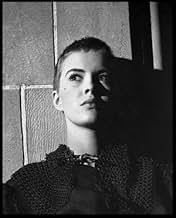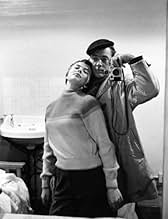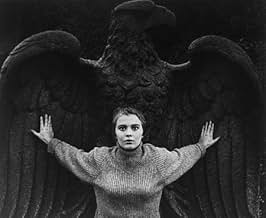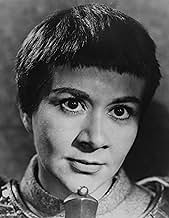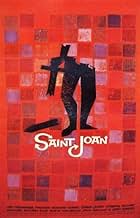Agrega una trama en tu idiomaIn 1456, French King Charles VII recalls the story of how he met the seventeen-year-old peasant girl Joan of Arc, entrusted her with the command of the French Army, and ultimately burned her... Leer todoIn 1456, French King Charles VII recalls the story of how he met the seventeen-year-old peasant girl Joan of Arc, entrusted her with the command of the French Army, and ultimately burned her at the stake as a heretic.In 1456, French King Charles VII recalls the story of how he met the seventeen-year-old peasant girl Joan of Arc, entrusted her with the command of the French Army, and ultimately burned her at the stake as a heretic.
- Dirección
- Guionistas
- Elenco
- La Tremouille
- (as Francis de Wolff)
- Dirección
- Guionistas
- Todo el elenco y el equipo
- Producción, taquilla y más en IMDbPro
Opiniones destacadas
As played by Jean Seberg(whose subsequent life offers a eerie parallel to her role here), she is presented as an innocent, a figure of purity whose very actions and presence reveals the corruption and emptiness in everyone. As such Seberg plays her as both Saint and Madwoman. Her own lack of experience as an actress when she made this film(which does show up in spots) conveys the freshness and youth of Jeanne revealing both the fact that Jeanne la Pucelle is a humble illiterate peasant girl who strode out to protect her village and her natural intelligence. By no means did she deserve the harsh criticism that she got on the film's first release, it's a performance far beyond the ken and call of any first-time actress with no prior acting experience. Shaw and Preminger took a secular view towards Joan seeing her as a medieval era feminist, not content with being a rustic daughter who's fate is to be married away or a whore picked up by soldiers to and away from battlefields. Her faith, her voices, her visions which she intermingles with words such as "imagination" and "common sense" leads her to wear the armour of her fellow soldiers to lead them to battle to chase the invading Englishman out of France.
And yet it can be said that the film is more interested in the court of the Dauphin(Richard Widmark), the office of the clergy who try Joan led by Pierre Cauchon(Anton Walbrook, impeccably cast) and the actions of the Earl of Warwick(John Gielgud) then in Joan herself. The superb ensemble cast(all male) portray figures of scheming, Machievellian(although the story precedes Niccolo) opportunists who treat religion as a childish toy to be used and manipulated for their own ends. The sharp sardonic dialogue gives the actors great fun to let loose. John Gielgud as the eminently rational Earl whose intelligence,(albeit accompanied by corruption), allows him to calculate the precise manner in which he can ensure Joan gets burnt at the stake and Anton Walbrook's Pierre Cauchon brings a three dimensional portrait to this intelligent theologian who will give Joan the fair trial that will certainly find her guilty. Richard Widmark as the Dauphin is a real revelation. As against-type a casting choice you'll ever find, Widmark portrays the weak future ruler of France in a frenzied, comic caricature that's as close as this film comes to comic relief. A comic performance that feels like an imitation of Jerry Lewis far more than an impetuous future ruler of France.
Preminger shot ''Saint Joan'' in black and white, the cinematographer is Georges Perinal who worked with Rene Clair and who did ''The Life and Death of Colonel Blimp'' in colour. It's perfectly restrained to emphasize the rational intellectual atmosphere for this film. Preminger's preference for tracking shots of long uninterrupted takes is key to the effectiveness of the film, there's no sense of a wasted movement anywhere in his mise-en-scene.
It also marks the direction of Preminger's most mature(and most neglected period) his focus is on the conflict between individuals and the institutions in which they work, how the institution function and how the individual acts as per his principles. These themes get their most direct treatment in his film and as always he keeps things unpredictable and finds no black and white answers. This is one of his very best and most effective films.
I'm not really sure that any other culture than the French ought to be telling her story, inevitably the interpretation will fall short of the mark. It falls short here because we have two diametrically opposed viewpoints working on the treatment.
The key to this film is that it is adapted from a play by George Bernard Shaw by Graham Greene. So we have the writing of a Fabian Socialist being interpreted by one very Catholic writer. I think there's a great deal more Greene than Shaw.
Shaw gets his innings here, but I think Graham Greene dominates the film. If he had lived I'm sure Shaw would not have approved.
Charles VIII in history or as portrayed by Richard Widmark here or Jose Ferrer in the Ingrid Bergman film about Joan of Arc, is not the noblest of monarchs. If you are a good Catholic, what he did was going against the will of the Deity. Otherwise though what he tries to do in consolidating his gains makes perfect good sense.
It's funny that I did a review of Olivier's Henry V which viewed from the English point of view which shows how the French got in the situation they were in. What happens afterwards is that Henry V dies quite suddenly like Alexander the Great and England with an infant monarch and fifty year plus struggle for power implodes internally.
Before he died however Charles VII disowned his son the Dauphin and blessed the marriage of Henry V to his daughter Katherine with the provision that Henry succeed Charles VII as King. The French for good reason do not list the English Henry as one of their kings.
Enter Joan of Arc whose visions inspire an army and a nation. As played by Jean Seberg she's in the right age group to be sure. But I think Ingrid Bergman being the far more skilled professional carries it off better in her film. Ditto for Jose Ferrer instead of Richard Widmark. The best acted parts in this film are Anton Walbrook as Cauchon the Bishop who presided over the trial and the clever and serpentine John Gielgud as the Earl of Warwick.
Maybe if Otto Preminger had chosen to film pure Shaw, Saint Joan would have been better received.
Shaw wanted to present his Joan differently and this movie is about Shaw's Joan. Preminger and Greene present a noble effort of Shaw's play. It is entertaining in that it tells a good story without over romanticizing Joan nor over vilifying her chief executioner, Cauchon (Anton Walbrook). Dunois, Bastard of Orleans (Richard Todd) supports Joan's efforts and serves as her fellow soldier-in-arms. Richard Widmark--as the Dauphin that Joan makes Charles VII--plays his role as a childish clown. Finally, (Sir) John Gielgud admirably presents the English side of this story as he portrays Warwick. This movie is quite worth while--especially for Shaw fans.
Otto Preminger did not commit sacrilege when he showed Joan reappearing one night in Charles the seventh's bedroom ,with other dramatis personae:bishop Cauchon,Dunois and the soldier who made a cross for the heroine with two pieces of wood just before she died."They cleared your name" the king says "Can you unburn me?" she says.Robert Shaw 's vision of Joan is not unlike that of Jean Anouilh in "l'alouette":Anouilh ended his play on a glorious note:he demolished the stake and he brought back Joan in Reims cathedral.
I sincerely believe that Otto Preminger's movie has been unfairly dismissed :in my native France,they say it's a static movie ,and however,I had never the impression to be watching a filmed stage production.To my mind ,it's the best Joan of Arc ,with the staggering exception of Dreyer's masterpiece ,of course,which will probably never surpassed.But all the others ,Bresson,Fleming,Rosselini,Besson (Besson???),Rivette ,et al,cannot hold a candle to Preminger:his Joan is a woman of flesh and blood and Jean Seberg (debut) had a strong presence .But the stand-out is definitely Richard Widmark :his fans won't recognize him,particularly in the sequences where he appears as the old king at the end of the road;but he gives a very fine portrayal of Charles the seventh ,probably outré -this king was finally a smart one :he knew when war had to give way to negotiation,which Joan could not understand.But watching Widmark the tough guy of many a western or a film noir playing hopscotch is just a joy.He easily outshines such luminaries as Jose Ferrer,in Fleming 's version or John Malkovich ,in Besson's video game.
There are funny anachronisms:"this horse cost 16 FRANCS" (the franc came much later);or Joan calling Gilles De Rais "Bluebeard" :Charles Perrault ,admittedly inspired by De Rais ,wrote his fairy tale more than two centuries later.But it's not a problem:Joan will come back after her death,and she will know the whole French history ,because ,unlike her contemporaries,she's eternal.The relationship Joan/Dunois is wonderfully treated :it's some kind of love story ,and seeing the young maid mother him brings something romantic .
One can regret a detail:it's not because she was afraid of prison for life that Joan was relapsed :it's because they took away from her her woman's clothes and thus forced her to dress up again as a man.It' minor ;Shaw's lines ,depicting these foolish things which Joan could not live without,if she were buried forever in a hole ,are deeply poetic.
I say it again:one of the best films about Joan Of Arc.
What was not originally appreciated about this film is that the story of Joan of Arc is an exceptionally simple one, but yet cloaked in mystery. Where the film failed was perhaps in not making us empathise with Joan, because we are given nothing of her motivations or her life before or after the seige at Orleans. Compare this to the Besson film, that fails in my eyes for the exact opposite reason, it gives us too much! I liked the film, but I liked it because although I couldn't empathise with a saint, I could empathise with a young woman who knew what she was doing, but didn't know where she was going. What I shall always remember about this film is Seberg's transformation from trusting, coy and innocent to bewildered, bothered and (dare I say it) bewitched. A great performance, and she really ought to have gone on to greater things.
¿Sabías que…?
- TriviaAudrey Hepburn was originally offered the role of Joan. It was rumored that she turned it down because her husband, Mel Ferrer, wasn't approached for the part of the Dauphin, but Ferrer denied this.
- ErroresWhen Joan and the King stand by the river rallying the troops, the infantry men come running down the hill to join them. One of them falls on his face.
- Citas
Inquisitor: [after condemning Joan to death by fire] It's a terrible thing to see a young and innocent creature crushed between the Church and the Law.
Cauchon: You call her innocent?
Inquisitor: Quite innocent, she didn't understand a word we were saying.
- Versiones alternativasAlso available in computer colorized version (Hal Roach VHS)
- ConexionesFeatured in La leyenda de Billie Jean (1985)
Selecciones populares
- How long is Saint Joan?Con tecnología de Alexa
Detalles
- Fecha de lanzamiento
- Países de origen
- Idiomas
- También se conoce como
- Die heilige Johanna
- Locaciones de filmación
- Productora
- Ver más créditos de la compañía en IMDbPro
Taquilla
- Total a nivel mundial
- USD 400,000
- Tiempo de ejecución
- 1h 50min(110 min)
- Color
- Mezcla de sonido
- Relación de aspecto
- 1.85 : 1

